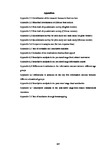AN INVESTIGATION OF THE ROLE OF FOOD TOURISM IN PROMOTING CHINESE REGIONS
| dc.contributor.supervisor | BUSBY, GRAHAM | |
| dc.contributor.author | CHEN, QIAN | |
| dc.contributor.other | Plymouth Business School | en_US |
| dc.date.accessioned | 2016-06-09T09:41:43Z | |
| dc.date.available | 2016-06-09T09:41:43Z | |
| dc.date.issued | 2016-05 | |
| dc.identifier | 10307616 | en_US |
| dc.identifier.uri | http://hdl.handle.net/10026.1/4872 | |
| dc.description | Full version unavailable due to 3rd party copyright restrictions | |
| dc.description.abstract |
Food tourism is an activity that can be promoted by destination marketers. The aims of this research are to provide a holistic examination of domestic tourists’ food experience in China, and to evaluate the potential of food tourism in promoting Chinese regions from the demand side. It has four specific research objectives, including (1) examining the food experience of domestic tourists at three different travel stages in China, (2) assessing the relationships between the food experience of tourists and their demographic profiles, (3) developing a structural model addressing the potential relationships between tourists’ food experience and loyalty intentions toward Chinese destinations, and (4) providing recommendations for marketers to achieve successful destination promotion through food tourism. In order to achieve the research aims and objectives, with the development of a structural theoretical model, a quantitative research design was employed in the study. Data was specifically collected from a sample of 1702 domestic tourists at ten representative destinations in Mainland China. The findings of this study revealed that: firstly, food is, overall, of great significance to Chinese domestic tourists; however, it plays a varying role in domestic tourists’ experiences at different travel stages in China. Secondly, demographic factors such as gender and age have influences on the food experience of Chinese domestic tourists, while educational level has been revealed to be of little influence. Thirdly, tourists’ food satisfaction and food-related behavioural intentions were in direct and positive correlation to tourists’ destination loyalty intentions. The findings highlighted the contribution of local food at a destination level in the context of China, and signified the great potential for destinations to utilise food tourism to attract and retain tourists. Moreover, given the interrelationships shown between the underlying factors of tourists’ food experience and tourists’ destination loyalty intentions, it is noted that tourists’ food experience is a complex multi-phase model among which different phases interrelate with each other exerting an influence on tourists’ loyalty intentions to specific destinations in China. Lastly, based on these findings, both theoretical and practical implications were derived. In particular, practical recommendations have been provided to marketers on how to effectively utilise food tourism to achieve successful destination promotion in China. | en_US |
| dc.language.iso | en | en_US |
| dc.publisher | Plymouth University | en_US |
| dc.subject | Food tourism | en_US |
| dc.subject | Tourism | |
| dc.subject | Destination promotion | |
| dc.subject | Tourist experience | |
| dc.subject | PLS-SEM | |
| dc.subject | China | |
| dc.title | AN INVESTIGATION OF THE ROLE OF FOOD TOURISM IN PROMOTING CHINESE REGIONS | en_US |
| dc.type | Thesis | |
| plymouth.version | Edited version | en_US |
| dc.identifier.doi | http://dx.doi.org/10.24382/4232 | |
| dc.identifier.doi | http://dx.doi.org/10.24382/4232 |
Files in this item
This item appears in the following Collection(s)
-
01 Research Theses Main Collection
Research Theses Main




